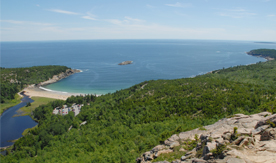
Ecological Changes, Economic Consequences
A $1.8 million grant from the National Science Foundation will allow a multidisciplinary team of researchers to examine the impact of rising ocean temperatures on the ecology and economics of the Gulf of Maine.
Led by Andrew Pershing from the University of Maine and Gulf of Maine Research Institute (GMRI), the team will conduct a four-year project as part of the NSF’s Coastal SEES (Science, Engineering and Education for Sustainability) Initiative to support collaborative studies.
“Climate change is impacting the distribution of fish and lobsters in the Gulf of Maine,” Pershing says, “and these ecological changes can have significant economic consequences.”
For instance, record warm ocean temperatures during 2012 prompted lobsters in the Gulf of Maine to migrate shoreward about a month early, making them easier to catch. Lobstermen proceeded to haul in record numbers of the crustaceans, but the overabundance of product on the market tanked the price paid to lobstermen.
“There’s a growing realization among scientists that complex problems like climate change and fisheries require us to work with people from other fields,” says Katherine Mills a co-investigator on this study from UMaine and GMRI.
The team includes climate scientists, oceanographers, fishery scientists and economists from UMaine, GMRI, Stony Brook University, NOAA’s Northwest Fisheries Science Center (NWFSC) and NOAA’s National Center for Atmospheric Research (NCAR).
“The Gulf of Maine is an ideal test site to examine relationships between climate change, oceanography, ecology and economics,” Pershing says. In addition to its economically valuable lobster and groundfish fisheries, the Gulf has strong temperature gradients and has been warming rapidly in recent years.
“Rising temperatures impact spatial and seasonal distributions of many fish and invertebrates,” says Janet Nye, an assistant professor at Stony Brook University. Shifts in the distribution and abundance of species drive changes to their interactions with each other, as well as changes to where, when and how many are caught.
As part of its multidisciplinary approach, the project has a dedicated education component through GMRI’s LabVenture! Program that annually reaches 10,000 Maine fifth- and sixth-grade students. The researchers will work with GMRI’s education specialists to develop a hands-on experience that enables students to explore how computer models help scientists understand complex interactions among species and the environment.
In addition to Pershing, Mills and Nye, the team includes Andrew Thomas, Richard Wahle and Yong Chen from the University of Maine; Jenny Sun, Tom Farmer and Frank Chiang from GMRI; Dan Holland from NWFSC; and Mike Alexander from NOAA Earth System Research Laboratory.
Contact: Beth Staples, 207.581.3777
